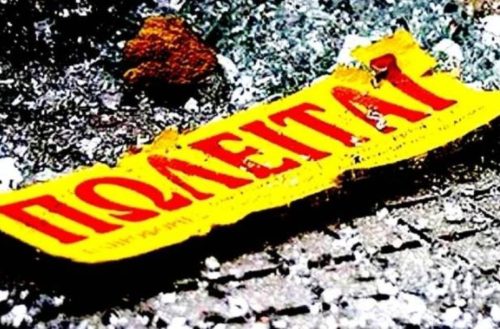By Dimitris Konstantakopoulos
“We did not impose the programme on Greece. The Greek government requested it”
This statement was made by the German Minister of Finance, Wolfgang Schäuble, who appears to claim, with increasing confidence, the title of “Europe’s murderer”. For a representative of a people who, if anything, are renowned for their straightforwardness, Mr Schäuble seems to fair remarkably well not only in hypocrisy but also in irrationality. Even if, for the sake of argument, we accept that the Greeks imposed on the Germans the Greek “bail-out programme” on the Germans, and not vice versa, why the German government agreed, co-signed, financed and is still insisting on continuing a programme which has demonstrably destroyed one of European Union’s member states? Why Mr Schäuble insists that “Greece must adhere to the agreed terms”?
Coming from a country with such rich tradition in the study of law, shouldn’t he already know that the agreements, signed in the past by the Greek governments, constitute a massive violation not only of the Greek constitution but also of European and international law?
A plan for the destruction of Greece.
It was Gabor Steingart, the chief editor of the leading German business newspaper Handelsblatt, who, in an interview to this author (“Kosmos tou Ependyti” , 29.6.2011) compared the Greek “bailout” programme to the “Morgenthau Plan”, the US post-WWII programme which provided for the destruction of German industrial infrastructure and for the return of Germany to the pre-industrial era. Ultimately, out of fear in the US that Germany would be “lost”, the Morgenthau Plan was abandoned for the Marshall Plan.
After all, Hermann Goering – in whose office in Berlin, if I am not mistaken, is sitting now in the German finance minister – has never claimed that Luftwaffe delivered humanitarian help to Greece! This is a significant difference between the day before yesterday and today, as Günter Grass pointed out in his poem about Europe’s shame, where he reminded that Hitler’s soldiers carried Heine’s books in their knapsacks during their campaign in Greece. I would like very much to know what Wolfgang Schäuble reads at night – that is, if he still does read at all.
He may do. His acquaintances told me that he has very good knowledge of ancient Greek literature. Well then, he can only refer to this literature to learn about the consequences of his policies. The city of Athens was destroyed when it started treating its allies, who helped fight the Persians and Spartans, as its vassals. The Athenians snatched away and relocated to Athens the Athenian League treasury, which until then was kept in Delos. They became no richer. They just laid the foundation of their own destruction!
Mr Schäuble could learn a few things from Norht Americans, who, at least, know that, in order to maintain their hegemony, they should occasionally give something over to its vassals. A banker however, cannot give anything. I find it very funny when bankers are accused of “greed”. They just do their job. Without a greedy character they wouldn’t be able to do this job properly! The government in Berlin does not put Greeks in a “destruction or submission” dilemma; they rather offer them the sole prospect of “both destruction and submission”. Is it possible that Berlin hopes that this policy can pass without any repercussions? (I am not talking here about SPD, the leadership of which, at crucial historical moments, seems unable to escape the reflexes of August 1914 and the policy of an era when it sacrificed Rosa Luxemburg and Karl Liebknecht for the celebrated “German order”).
The fact that the most powerful nation in Europe (except Russia) boast this type of leadership, at a time when the other large nation, France, appears almost decapitaded, without any type of leadership, does not bode well for the European continent!
Some months ago, the atlanticist Mr. Schäuble extended to new areas the “economism” that characterises his political thought when speaking to “American friends” in Washington. We will defeat Russia with our economic power, he promised his audience. It may be true that sometimes economic power may prove stronger than military power. But the idea that we will defeat Russia, in the light of the historical experience of Napoleon, Hitler and the Russian revolution, shows, the least, a lack of seriousness. There is no need for Mr Schäuble to study Russian history. He could also learn from the study of German history, in particular of the roots of the 1st WW, that there are no nations, which consent indefinitely and without protest or resistance, to the rules of a world designed against them!
Worse still, when coming from influential politicians, such approaches cannot be simply put aside as historically uninformed; rather, by reducing the ability of the political apparatus of the West for serious risk assessment, such approaches increase considerably the real risk of a third WW.
What Wolfgang Schäuble “forgets”
Certainly the German Government did not “impose” the programme on Greece, very much like Pontius Pilate did not take the decision to crucify Jesus. But there are two small “details” that Mr Schäuble forgot to mention to his fellow countrymen. Firstly, that Greece was governed by a coalition of two parties, the members of which were admittedly receiving huge bribes from the German company Siemens and therefore could easily become the target of blackmail by those who could prove the bribery. Those who are primarily responsible for this case of bribery – which, although not the only one, played a significant role in the manipulation of politics in Athens and contributed considerably to the creation of many of the problems the country now faces – have been offered asylum by Germany, while at the same time the German media accuse Greeks for corruption. A third person, who knew all too well the truth about the bribes, decided to escape by committing suicide, in a very convenient way for those who still seek the truth.
Moreover, the “outbreak” of the Greek corruption, coincided with the period of the administration of Mr. Simitis, the prime minister who is associated to German interests more closely than any other Greek prime minister of the post-war period!
The second and even most important “detail”, that the former banker and now politician forgets to mention to his countrymen, is the partnership he formed with representatives of Goldman Sachs and other such “charitable foundations”, in a plan which involved Greece’s attack by the ‘markets”, creating the need for the pre-planned “bailout programme”. The monstrous, as it turned out, Maastricht Treaty did not provide for any enforcement mechanism. This mechanism was found instead in a partnership with the “markets”. But the Germans, especially, should know that there is a heavy price to pay in any Faustian bargain.
The impersonal, but well known “markets”, would not dare to risk their money back in 2009-10 by attacking an EU country, if they didn’t know for sure that Berlin would leave them undisturbed. The high esteem to which this bank is held in Germany is demonstrated in many ways. It is, after all, a bank’s veteran, Mario Draghi the person appointed as head of the “European” Central Bank, at the non-elected office of the supranational economic prime minister of Europe, with the mandate to blackmail and even destroy any EU member-state that does not “follow” the “rules of the game”, as we have seen the last weeks and months in the Greek case.
We don’t need to remind here German history, but there is a deep irony, as in all historical tragedies, in the way in which the greatest “nationalist” of the conservative German establishment does business with the representatives of the said bank. An even deeper irony is that this destructive and suicidal policy, which some attribute to residues of Romanticism, hides, in the country of Hegel and Marx, behind the supposed power of Reason!
Probably Mr. Schäuble believes that such partnerships are helping to “discipline” the “unruly” Greeks, who in his eyes symbolise everything that is opposite to the German “virtues”. I am afraid though, that he did not accurately appreciate the consequences of his actions. German economic power alone is not enough to subdue the whole continent; nor is it enough the political power of his bankers friends who wish to control the political elite of Europe. However, their joint power may unfortunately be sufficient to engage the continent to a series of painful conflicts which shall decisively weaken its international standing and influence.
Certainly, based on the way they conduct politics, what both Schäuble and Merkel will ultimately succeed in doing, is to destroy the great political capital earned by Germany in Europe and globally, through its post-war economic miracle, the hard work of its people, including that of immigrants from southern Europe, and through its commitment to the European unification project. Unfortunately, although things may momentarily appear to differ in form, in substance history has often a despairing tendency to repeat itself, in Germany in Greece and everywhere in the world.
An inadvertent confession
The need that the German Finance Minister felt to make excuses for himself, expressing even the apparently absurd idea that the Greeks are responsible for the programme he himself, with the help of ‘markets’ and the IMF, imposed on them, reveals how today’s European politicians come short when confronted with politics. They are “test-tube politicians”, who haven’t emerged from a process of significant political battles with worthy political opponents, but have instead risen to power through the manipulations conjured by the strong players of the financial capital system, with the objective to control the political elite of the European continent. They are more employees than they are politicians. Moreover, their programme is not for public disclosure. Should they discuss in public what they really want to achieve, or rather what the bankers who appointed them want to achieve, even the stones will cry out in Europe in protest against them!
Today’s European politicians are the product of a very particular historical period which started with the collapse of the European left and its integration into the established status quo and especially with the collapse of the USSR. They are also the product of decades of successful “filtering” of European politics and of a very successful strategy of “entryism” into the political elites, using in particular generalized corruption and the possibility to blackmail anybody, by the financial capital and by the most extremist representatives of the deep American state, organised around a “neoliberal” and “neoconservative” core respectively.
Did you see their frightened looks on TV when Tsipras announced the referendum? Did you notice the changes in their facial expressions depending on the changes of to the Greek prime minister’s determination? When Greece puts the Greek problem in a direct, decisive, satisfactory and intelligent way, they have no answers.
We have reached a point where the outcome will depend on the people’s determination and on the ability of its leadership to withstand the political arm-wrestling with its Creditors; such leadership should abandon the “habit” of the last four decades to resort to demagogy and learn to say the whole truth to its people, it should seek alliances everywhere and would embark on a clever political counterattack at international level, exhibiting in the same time, at the domestic level a high degree of soberness in the management of state affairs.
In these terms, prepared with plans A, B or C and the determination to implement them, Greece may win, or at least it may give this battle in a way that shall create the potential space and terms for an acceptable compromise.
In order to survive as a people we must fight for our existence, leaving behind any illusions, bidding with dignity farewell “the Alexandria we lost”. This is our only option!
Athens, 3 July 2015
Konstantakopoulos.blogspot.com






